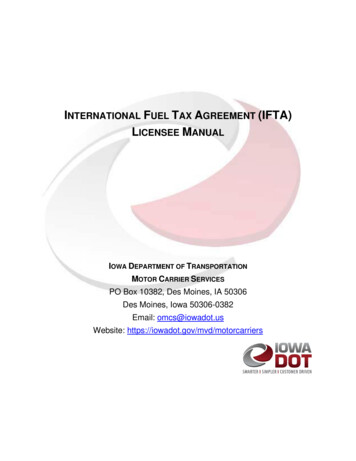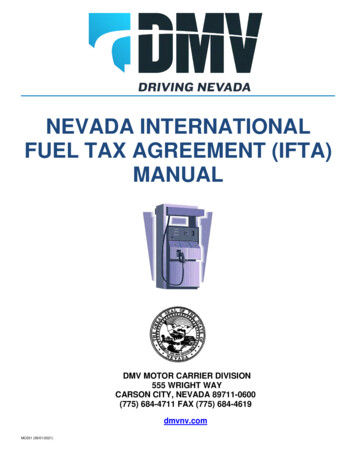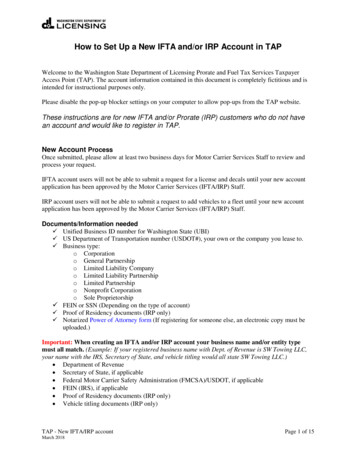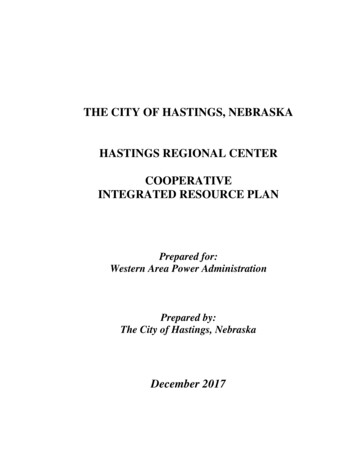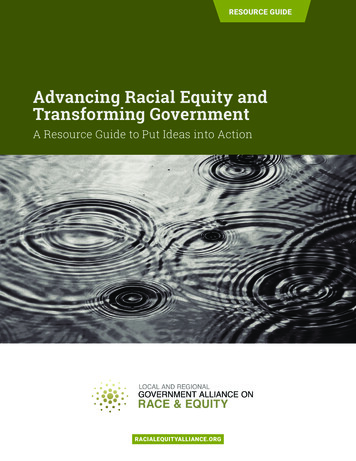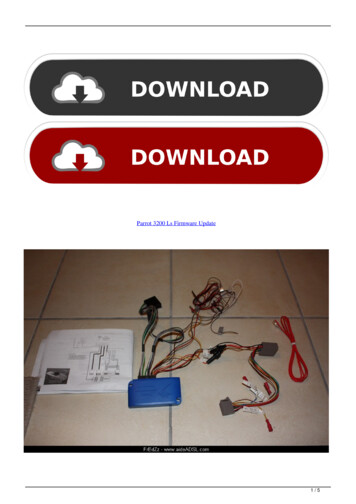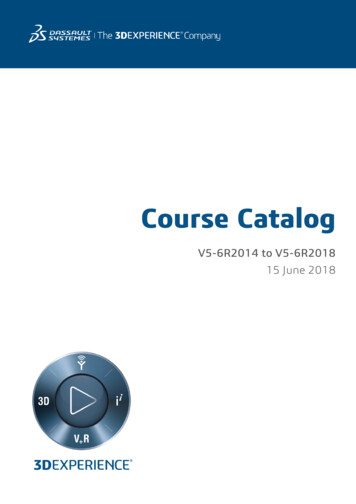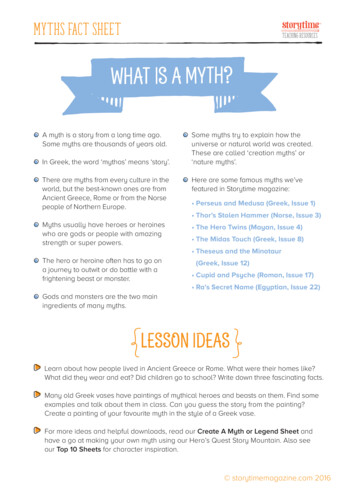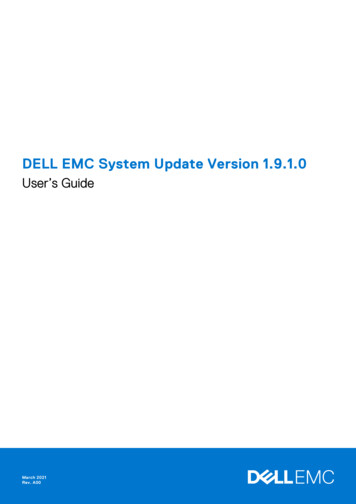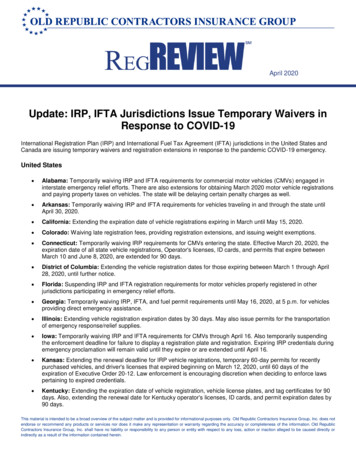
Transcription
April 2020Update: IRP, IFTA Jurisdictions Issue Temporary Waivers inResponse to COVID-19International Registration Plan (IRP) and International Fuel Tax Agreement (IFTA) jurisdictions in the United States andCanada are issuing temporary waivers and registration extensions in response to the pandemic COVID-19 emergency.United States Alabama: Temporarily waiving IRP and IFTA requirements for commercial motor vehicles (CMVs) engaged ininterstate emergency relief efforts. There are also extensions for obtaining March 2020 motor vehicle registrationsand paying property taxes on vehicles. The state will be delaying certain penalty charges as well. Arkansas: Temporarily waiving IRP and IFTA requirements for vehicles traveling in and through the state untilApril 30, 2020. California: Extending the expiration date of vehicle registrations expiring in March until May 15, 2020. Colorado: Waiving late registration fees, providing registration extensions, and issuing weight exemptions. Connecticut: Temporarily waiving IRP requirements for CMVs entering the state. Effective March 20, 2020, theexpiration date of all state vehicle registrations, Operator's licenses, ID cards, and permits that expire betweenMarch 10 and June 8, 2020, are extended for 90 days. District of Columbia: Extending the vehicle registration dates for those expiring between March 1 through April28, 2020, until further notice. Florida: Suspending IRP and IFTA registration requirements for motor vehicles properly registered in otherjurisdictions participating in emergency relief efforts. Georgia: Temporarily waiving IRP, IFTA, and fuel permit requirements until May 16, 2020, at 5 p.m. for vehiclesproviding direct emergency assistance. Illinois: Extending vehicle registration expiration dates by 30 days. May also issue permits for the transportationof emergency response/relief supplies. Iowa: Temporarily waiving IRP and IFTA requirements for CMVs through April 16. Also temporarily suspendingthe enforcement deadline for failure to display a registration plate and registration. Expiring IRP credentials duringemergency proclamation will remain valid until they expire or are extended until April 16. Kansas: Extending the renewal deadline for IRP vehicle registrations, temporary 60-day permits for recentlypurchased vehicles, and driver's licenses that expired beginning on March 12, 2020, until 60 days of theexpiration of Executive Order 20-12. Law enforcement is encouraging discretion when deciding to enforce lawspertaining to expired credentials. Kentucky: Extending the expiration date of vehicle registration, vehicle license plates, and tag certificates for 90days. Also, extending the renewal date for Kentucky operator's licenses, ID cards, and permit expiration dates by90 days.This material is intended to be a broad overview of the subject matter and is provided for informational purposes only. Old Republic Contractors Insurance Group, Inc. does notendorse or recommend any products or services nor does it make any representation or warranty regarding the accuracy or completeness of the information. Old RepublicContractors Insurance Group, Inc. shall have no liability or responsibility to any person or entity with respect to any loss, action or inaction alleged to be caused directly orindirectly as a result of the information contained herein.
Maine: Requests that no enforcement action be taken against vehicles with expired IRP or IFTA registrations forthe next 30 days. Maryland: Asking enforcement personnel to refrain from taking action against motor carriers with apportionedvehicle registrations expiring on or after March 12, until further notice. Allowing a 15 percent tolerance abovetypical weight limits. Michigan: IRP office closed until further notice. Waiving enforcement of IRP requirements through the end ofApril. Additionally, requesting that law enforcement refrain from taking action on IRP vehicles with expiredregistrations. Mississippi: Suspending IRP and IFTA for motor carriers engaged in emergency relief traveling. Any stateapportioned registration set to expire on March 31, 2020, will be extended to April 30, 2020. Missouri: Temporarily suspending all IRP, IFTA, and trip and fuel permit requirements, and allowing private andfor-hire carriers to haul up to 100,000 pounds with trailers at least 53 feet long through April 30. Montana: Extending the March expiration dates of IRP license plates until further notice. Nebraska: Declaring vehicle registrations expiring on or after March 1, 2020, are valid until 30 days after thelifting of the declaration of emergency. Late filing penalties and interest have been waived. Expiration dates forNebraska driver licenses and commercial driver licenses are also extending until 30 days after the lifting of theemergency. Nevada: All DMV offices closed. Additionally, the state is temporarily waiving IRP and IFTA requirements for theduration of the emergency or until April 15, whichever comes first. New Jersey: Temporarily waiving IRP and IFTA requirements for vehicles traveling through the state. IRP vehicleregistrations and temporary IRP registrations that expire in March through May 2020 are extended until May 31,2020. New York: Closing all DMV offices until further notice. Additionally, IRP vehicle registrations and temporaryregistrations expiring on or after March 1, 2020, are extended through April 19, 2020. North Carolina: Waiving the enforcement of IRP registration requirements. Additionally, the state is waiving themaximum hours of service and certain size and weight restrictions. Waivers will be in effect for 30 days, or untilrescinded or superseded by another executive order. North Dakota: Granting expiration extensions until May 31 for IRP vehicles expiring on March 31. Ohio: Asking enforcement personnel to refrain from taking enforcement action on vehicles that have IRPexpiration dates on or after March 18, 2020, until further notice. Oklahoma: Temporarily suspending oversize/overweight permits fees and registration licensing/operatingauthority requirements for vehicles involved in emergency support efforts. Oregon: Temporarily suspending requirements for oversize/overweight permits, permits and interstateregistration requirements for commercial transportation, trip permits, insurance requirements, and hours ofservice. Pennsylvania: Closed all Driver License Centers for two weeks effective March 16 and extending expirationdates for vehicle registrations. Rhode Island: Driver's licenses and registrations expiring between March 1 and March 31, 2020, will now expireon April 30, 2020. All 5-day temporary registration plates issued between March 1 and March 31, 2020, will bevalid up to 40 days from the date of issuance. South Carolina: Temporarily waiving IRP and IFTA requirements for out-of-state vehicles and also extendingregistrations that expire March 1 through June 30, 2020, until July 1, 2020.
Tennessee: Temporarily waiving IRP and IFTA requirements for vehicles traveling through the state. Texas: Temporarily waiving registration and licensing requirements, normal weight and width restriction, andhours of service until April 12. Utah: The Tax Commission building and most Utah DMV offices are closed. Utah also suspended IRPregistration requirements until further notice. Law enforcement personnel are also requested to refrain from takingaction against registrants with expired Utah registrations. Vermont: Temporarily waiving IRP/IFTA and trip permit requirements for vehicles, also requesting thesuspension of enforcement against registrants with expired credentials for 90 days. Virginia: Temporarily waiving normal weight and width restrictions until May 19, 2020. Vehicle registrations dueto expire on or before May 15, 2020, will be extended 60 days. Virginia is also asking that law enforcementagencies refrain from taking action against apportioned license plates expiring in March and April 2020. EffectiveMarch 17, the Department of Motor Vehicle offices will be closed for 14 days. Washington: Extending the expiration of IRP license plates expiring between March 31 and April 30, 2020, toMay 31, 2020. Newly registered vehicles under IRP will be issued a Temporary Evidence of ApportionedRegistration instead of physical license plates as necessary. IRP offices are closed until further notice. Alsotemporarily waiving IFTA, three-day trip, and special fuel permit requirements. West Virginia: Extending the validity period for vehicle registrations due to expire on or before May 15, 2020, for90 days. Wisconsin: Extending waiver for all transportation permits to April 11, 2020. Wyoming: Suspending IRP and IFTA registration requirements for motor vehicles participating in emergencyrelief efforts. The state is also asking that enforcement personnel refrain from taking enforcement action onvehicles with Wyoming IRP vehicle registrations that have expiration dates on or after March 20, 2020FMCSA Grants Three-Month Waiver from Certain CLPRegulationsThe Federal Motor Carrier Safety Administration (FMCSA) is temporarily easing the standards for obtaining a commercialdriver's license (CDL) in response to the Coronavirus (COVID-19) outbreak.FMCSA granted a three-month waiver from certain commercial learner's permit (CLP) regulations. The waiver is set toexpire on June 30, 2020.Social distancing guidelines from the U.S. Centers for Disease Control and Prevention have increased the rate ofemployee absences or forced the closure of state driver licensing agencies. The closures mean that states have beenunable, in a timely fashion, to process and issue CDL credentials to CLP holders who have passed the driving skills test.The first part of the waiver covers 49 CFR 383.235(a)(1) and ensures that law enforcement will not take action againstCLP holders for the operation of a commercial motor vehicle (CMV) without a CDL holder present in the front seat of thevehicle if the driver is in possession of: Authorization from a state driver licensing agency or third-party tester that the CLP holder has passed the CDLdriving skills test and; A valid non-CDL driver's license, CLP, and medical certificate unless covered under a waiver issued on March 24,2020.
Under this provision, though the CDL holder is not required to be in the front seat of the vehicle, the CDL holder must bein the cab of the vehicle. This provision does not allow a CLP holder to operate a CMV solo. The CLP holder must beaccompanied by an individual with a valid CDL.The waiver does not apply if the CLP holder's driving privileges have been suspended, withdrawn, or if the CLP holder isprohibited from performing safety-sensitive functions under the drug and alcohol regulations (49 CFR 382).The second part of the waiver covers 49 CFR 383.79(a), which allows states to administer a driving skills test to anynondomiciled CDL applicant regardless of where an applicant received driver training.This is the second CLP-related COVID-19 waiver that the FMCSA has granted within the last week. On March 24, theFMCSA granted a waiver for certain CDL, CLP, and medical-certification requirements, allowing certain drivers to operatewith an expired driver's license and/or medical card until June 30 if they were unable to renew because of the outbreak.EPA Speeds up Reviews of Disinfectants Claiming to KillCoronavirusIn response to the COVID-19 outbreak, EPA has expedited its review of submissions from companies requesting to addemerging viral pathogen claims to their surface disinfectant labels. The Agency stresses that this applies only to alreadyEPA-registered surface disinfectants.EPA says that in many cases, it has approved claims within 14 days, compared to the more typical 90-day window. EPAsays product registrants should: Review the “Emerging Viral Pathogen Claims for SARS-CoV-2: Submission Information for Registrants” webpageand submit all the listed information. Among the key pieces needed are product-specific terms of registration anda revised label that includes the emerging viral pathogens claim.When purchasing a product, consumers should: Check if its EPA registration number is included on “List N: Disinfectants for Use Against SARS-Co-V-2.” If it is,the product can be used against COVID-19. This number is found on the product label; look for the first two setsof numbers of the EPA Reg. No.While products may be marketed and sold under different brand names, EPA notes that if they have the samefirst two sets of EPA registration numbers, they are related products. If EPA Reg. No. 12345-12 is on List N,consumers can buy EPA Reg. No. 12345-12-2567 and use the same contact time and virus from List N.In 2016, EPA established a process for adding emerging viral pathogen claims to EPA-registered disinfectant products toaccelerate the availability of products when a public health crisis is declared.International Roadcheck Postponed due to CoronavirusInternational Roadcheck, an annual inspection event hosted by the Commercial Vehicle Safety Alliance (CVSA), has beenpostponed due to the coronavirus (COVID-19) outbreak.
Roadcheck was scheduled for May 5-7 throughout the United States, Canada, and Mexico. By postponing for 2020 andnot canceling, CVSA is leaving open the opportunity to reschedule the event later this year.Inspections still taking placeCOVID-19 has forced the Federal Motor Carrier Safety Administration (FMCSA) to temporarily waive federal rules relatedto everything from drug and alcohol testing to hours of service. But CVSA is reminding motor carriers that roadside safetyinspections and traffic enforcement will continue daily as departmental health and safety policies and procedures allow.Other events remain scheduledRoadcheck is CVSA's only public enforcement initiative scheduled for 2020 that has been postponed.Still on the calendar is the Operation Safe Driver Week, scheduled for July 12-18, and Brake Safety Week, set for August23-29.FMCSA Addresses DOT Drug and Alcohol Testing DisruptionsDuring COVID-19Motor carriers who are subject to DOT drug and alcohol testing under the Federal Motor Carrier Safety Administration(FMCSA) received guidance from the agency, allowing for some flexibility until May 30, 2020, due to the COVID-19pandemic.Previously, DOT's Office of Drug and Alcohol Policy & Compliance (ODAPC) provided information about the impact of thenational emergency on DOT testing requirements for employers, employees, and service agents. The COVID-19 nationalemergency has created disruptions that are interfering with, and often preventing compliance with the drug and alcoholtesting requirements.The FMCSA has provided the following guidance (in addition to ODAPC's notice) in respect to testing operators ofcommercial motor vehicles (CMVs) requiring commercial drivers' licenses (CDLs). The guidance is in effect until May 30,2020, which is 90 days from the President's Proclamation on Declaring a National Emergency Concerning the NovelCoronavirus Disease (COVID-19) Outbreak.Note that drivers operating under the March 13 emergency declaration, who may be exempt from hours of service andother safety regulations while engaged in emergency response, are not exempt from drug and alcohol testing.Random testsRandom testing must be administered evenly throughout the calendar year, and carriers are advised to make randomselections at least quarterly.Employers who are experiencing disruptions as a result of COVID-19 and are unable to complete their random selectionsand tests should: Document in writing:o The specific reasons why they were unable to conduct tests on drivers who were randomly selected, ando Any actions taken to locate an alternative collection site or other testing resources; and Make up the tests by the end of the year.
Pre-employment testsBefore a driver can perform a safety-sensitive function, the motor carrier must have a verified negative pre-employmentdrug screen result, unless the criteria for the pre-employment exception in §382.301(b) are met and documented. Theagency has not offered any exemption during the national emergency.Post-accident testsIf circumstances warrant DOT post-accident testing following a CMV crash, motor carriers must make all attempts to testthe driver in accordance with §382.303.If disruptions associated with the COVID-19 national emergency prevent the motor carrier from carrying out the alcoholtest within eight hours following the accident or drug testing within 32 hours, it must document the specific reasons. Thisguidance aligns with current regulatory requirements in §382.303(d).Reasonable suspicion testsIf a motor carrier is unable to carry out a reasonable suspicion test due to the national emergency, it must document inwriting the specific reasons why the test could not be conducted as required. The motor carrier's explanation shouldinclude any efforts it made to mitigate the disruption, such as trying to locate an alternative collection site.In the event of an investigation, the documented circumstances would be provided to enforcement, along with the trainedsupervisor's observations leading to the request of the test. The need for an explanation of why a reasonable suspiciontest was not performed is nothing new; it appears in §382.307(e)(1) and (2).Return-to-duty testsThe FMCSA has not offered any exemption to the return-to-duty test requirements. Drivers who are subject to anevaluation, treatment, and negative return-to-duty test following a DOT violation under Part 382 must complete therequired steps prior to performing a safety-sensitive function again.Follow-up testsMotor carriers should make all attempts to follow through with a driver's testing plan, including efforts to locate alternatefacilities.If follow-up testing cannot be completed, the motor carrier must: Document the specific reasons for the missed test; Document efforts to mitigate the disruption; and Conduct the test as soon as practicable.Reminder on refusals to testMany employees are concerned about contracting COVID-19 while at a clinic for DOT testing.Employers should be sensitive to employees who indicate they are not comfortable or are afraid to go to clinics orcollection sites. If testing at a later date is not an option, DOT suggests that employers contact the facility to verify that ithas taken the necessary precautions to minimize the risk of exposure to COVID-19.However, once an employee is notified of testing and fails to go to the clinic, it is the employer's responsibility to evaluatethe circumstances of the employee's refusal to test and determine whether or not the employee's actions should beconsidered a refusal.Drivers should be reminded of what constitutes a refusal to test (see §§40.191 and 40.261). A refusal to test, excludingpre-employment testing, includes: Failing to go to the clinic when instructed;
Showing up late to the clinic after instructed to proceed immediately; Leaving the clinic without providing an adequate sample for testing; Fail to cooperate with any part of the testing process; and Failing to allow a direct observation when applicable.FMCSA: Waivers Granted for Expired CDLs,CLPs, and medical cardsThe Federal Motor Carrier Safety Administration (FMCSA) has granted a waiver for certain commercial driver's license(CDL), commercial learner's permit (CLP), and medical-certification requirements due to the COVID-19 (Coronavirus)outbreak.The waiver will allow certain drivers to operate with an expired driver's license and/or medical card until June 30, 2020, ifthey were unable to renew them due to the outbreak.The waiver is effective March 20, 2020, through June 30, 2020. It applies to CDL holders, CLP holders, and otherinterstate drivers operating commercial motor vehicles (CMVs) during the national emergency declaration due to COVID19.Several states are experiencing above-normal employee absences or have closed state driver licensing agencies due tothe coronavirus outbreak. As a result, many CDL and CLP holders are unable to renew their licenses and permits and areunable to provide medical certificates to their state agencies.Drivers who held a valid CDL or CLP and/or medical card as of February 29, 2020, that expired on or after March 1, 2020,may continue to drive with the expired license, permit, or certificate until June 30. Under the medical-card waiver, driversmust have proof of a valid medical certification that was issued for a period of 90 days or longer, and that expired on orafter March 1, 2020.The emergency waiver applies to the following requirements from the Federal Motor Carrier Safety Regulations: The maximum eight-year renewal period for CDLs due for renewal on or after March 1, 2020. (49 CFR383.73(b)(9) and 383.73(d)(6)) The maximum one-year renewal period for CLPs due for renewal on or after March 1, 2020, without requiring CLPholders to retake the general and endorsement knowledge tests. (49 CFR 383.73(a)(2)(iii) and 383.25(c)) The requirement that CLP holders wait 14 days to take the CDL skills test. (49 CFR 383.25(e)) The requirement that CDL holders, CLP holders, and non-CDL drivers have a medical examination andcertification, provided they have proof of a valid medical certification that was issued for a period of 90 days orlonger, and that expired on or after March 1, 2020. (49 CFR 391.45) The requirement that, in order to maintain the medical certification status of "certified," CDL or CLP holdersprovide the state driver licensing agency with an original or copy of a subsequently issued medical examiner'scertificate, provided that they have proof of a valid medical certification that expired on or after March 1, 2020. (49CFR 383.71(h)(3)) The requirement that the state driver licensing agency change the CDL or CLP holder's medical certificationstatus to "not certified" upon the expiration of the medical examiner's certificate or medical variance, provided theCDL or CLP holders have proof of a medical certification that expired on or after March 1, 2020. (49 CFR383.73(o)(2))
The requirement that the state driver licensing agency initiate a CDL or CLP downgrade upon the expiration of themedical examiner's certificate or medical variance, provided that the CDL or CLP holders have proof of a validmedical certification or medical variance that expired on or after March 1, 2020. (49 CFR 383.73(o)(4))Coronavirus Creates a Headache for DOT Testing ProgramsThe current Emergency Declaration for those providing direct assistance to the crisis does not include an exemption fromthe testing rules in Part 382. Even if the agency were to exempt eligible motor carriers from testing, those who are notassisting in emergency-response efforts are still finding it difficult to manage their DOT testing programs during the crisis.What are motor carriers encountering?Motor carriers are finding that their collection sites are either closed or cancelling appointments for DOT tests. The motorcarriers, in many instances, are not finding available alternatives.Yet others are finding that providers are refusing to take drivers who appear to have symptoms of the virus, even if it is acommon cold. Testing facilities are concerned about the welfare of their urine specimen collectors, breath alcoholtechnicians (BATs), and the drivers. The sanitation of a breath alcohol testing device cannot involve the use of an alcoholbased cleaner, and hand sanitizer cannot be used near or by someone administering an alcohol test.Many drivers have voiced concerns over exposure to COVID-19, stating they will not go for a test if randomly selected. If adriver fails to go for a test once notified, it is a refusal to test, even under these extenuating circumstances.What are your options?Unless FMCSA offers some guidance and an exemption to Part 382, carriers may just have to wait it out. As long as arandomly selected driver is not notified of his or her random selection, the driver is not in violation and can be sent at alater date - when everything calms down.If you are at the end of your random testing cycle and opt to send the driver in the next cycle, you are in violation for notsending the driver during the selection period. But if you send the driver as soon as it is practicable, even if in the nexttesting cycle, the test is counted toward your annual percentages.The Families First Coronavirus Response Bill Signed into LawOn Wednesday night (3/18/2020), the President signed the Families First Coronavirus Response Act into law. The Senatepassed it only that afternoon. The leave provisions become effective April 2 and expire on December 31, 2020.The measure has multiple sections, including emergency family and medical leave expansion, emergency paid sick leave,and tax credits for paid leave.FMLA expansionEmployers with fewer than 500 employees would be covered by the expanded portions of the FMLA. Employees would beentitled to the extra FMLA leave reason if they have worked for the company for at least 30 days. Employers may,however, exclude healthcare providers or emergency responder employees from this emergency FMLA entitlement.The extra reason employees may take FMLA leave is when an employee is unable to work (or telework) due to a need forleave to care for the child because the child’s school or place of care has been closed, or the childcare provider isunavailable due to a public health emergency.
The first 10 days of this FMLA leave would be unpaid, but the remainder of the 12 weeks would be paid at 2/3 theemployee’s regular rate of pay, up to 200 per day and 10,000 total. Employees could choose to use accrued paid timeoff (including the emergency paid sick leave) for the unpaid ten days, but employers may not require that they do so.If an employer has fewer than 25 employees, the restoration provisions would not apply. Employers need not reinstateemployees if their positions no longer exist due to economic conditions caused by the emergency. In such situations,however, those small employers must make reasonable efforts to contact a displaced employee for up to one year afterthey are displaced if an equivalent position becomes availablePaid sick leaveEmployers with fewer than 500 employees will need to provide paid sick leave to all employees, regardless of how longemployed with the company. Employees will be immediately entitled to paid sick leave for the following reasons:1) The employee is subject to quarantine or isolation order.2) The employee has been advised to self-quarantine due to concerns related to COVID-19.3) The employee is experiencing symptoms and seeking a medical diagnosis.4) The employee is caring for an individual under quarantine or isolation.5) The employee is caring for a child because the school or daycare is closed, or the childcare provider isunavailable.6) The employee is experiencing any other substantially similar condition specified by the enforcing agencies.Full-time employees would be entitled to up to 80 hours of paid sick leave. If, however, an employee is caring for a familymember (for reasons 4, 5, and 6), sick leave is paid at two-thirds the employee’s regular rate.Part-time employees would be entitled to an amount of leave reflecting an average two-week period.The paid sick leave is limited to 511 per day ( 5,110 in total) if leave is taken for an employee’s own illness orquarantine; and 200 per day ( 2,000 in total) if leave is taken to care for others or school closures.The paid sick leave provisions include a posting requirement. The DOL is to provide a model notice within seven days.The paid sick leave is not retroactive.Employers must allow employees to first use emergency paid sick leave under this new law, and then employees maydecide to use any remaining accrued paid leave under the employer’s policy. Employers may not require employees touse accrued leave under an employer policy first.Tax creditsEmployers who provided paid sick leave are allowed a tax credit of up to 100 percent of the wages paid to employees.This credit is allowed against the tax imposed by the employer portion of Social Security taxes.Colorado Emergency Rule Provides Four Days of Paid SickLeaveOn Wednesday, March 11, Colorado Governor Jared Polis declared a state of emergency in response to COVID-19. Aspart of this response, he included directives for the Colorado Department of Labor and Employment to accomplish thefollowing: Engage in emergency rulemaking for temporary paid sick leave, and
Identify additional supports and wage replacement such as access to unemployment insurance.The Colorado Health Emergency Leave with Pay Rules (“Colorado HELP” 7 CCR 1103-10) requires employers to provideup to four days of paid sick leave for employees with flu-like symptoms who are being tested for COVID-19. The paid sickleave ends if an employee receives a negative COVID-19 test result.The requirement applies to employers only in select industries. Those industries include leisure and hospitality; foodservices; childcare; education, including transportation, food service, and related work at educational establishments;home health, if working with elderly, disabled, ill, or otherwise high-risk individuals and; nursing homes and communityliving facilities.The rules do not require employers to offer additional days of paid sick leave if they already offer all employees enoughpaid leave to comply with the requirement. An employee who already exhausted his or her paid leave allotted by theemployer, but then has flu-like symptoms and is being tested for COVID-19, however, is entitled to the additional paid sickdays.This requirement does not cover wage replacement should an employee test positive and require quarantine resulting inlost work time and wages.Workers are covered regardless of pay rate or method (hourly, weekly, piece rate, etc.); the daily pay during leave iseither their established daily rate or, if their pay fluctuates, their average daily pay for the past month.The emergency rules took effe
Arkansas: Temporarily waiving IRP and IFTA requirements for vehicles traveling in and through the state until April 30, 2020. California: Extending the expiration date of vehicle registrations expiring in March until May 15, 2020. Colorado: Waiving late registration fees, providing registration extensions, and issuing weight exemptions.
